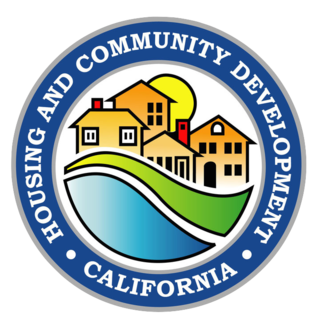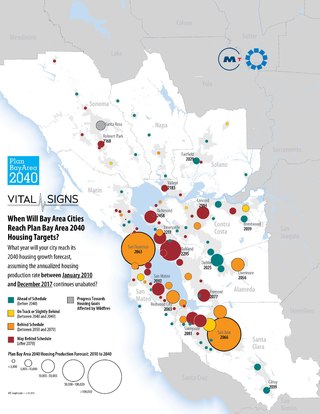Related Research Articles
The YIMBY movement is a pro-housing social movement that focuses on encouraging new housing, opposing density limits, and supporting public transportation. It stands in opposition to NIMBY tendencies, which generally oppose most forms of urban development in order to maintain the status quo.

Anthony J. Portantino is an American politician who served in the California State Senate from 2016 to 2024. A Democrat, he represented the 25th Senate District which encompasses portions of the San Fernando and San Gabriel Valleys. Portantino was a member of the California State Assembly from 2006 to 2012, representing the 44th Assembly District.

Nancy Skinner is an American politician who served as a member of the California State Senate from 2016 to 2024. A Democrat, she represented California's 9th State Senatorial district, encompassing parts of the East Bay.
The Sustainable Communities and Climate Protection Act of 2008, also known as Senate Bill 375 or SB 375, is a State of California law targeting greenhouse gas emissions from passenger vehicles. The Global Warming Solutions Act of 2006 sets goals for the reduction of statewide greenhouse gas emissions. Passenger vehicles are the single largest source of greenhouse gas emissions statewide, accounting for 30% of total emissions. SB 375 therefore provides key support to achieve the goals of AB 32.

Scott Wiener is an American politician who has served in the California State Senate since 2016. A Democrat, he represents the 11th district, encompassing San Francisco and parts of San Mateo County. He is also the co-chair of the California Legislative Jewish Caucus.

The California Department of Housing and Community Development (HCD) is a department within the California Business, Consumer Services and Housing Agency that develops housing policy and building codes, regulates manufactured homes and mobile home parks, and administers housing finance, economic development and community development programs.

Starting in the 1990s, the city of San Francisco and the surrounding San Francisco Bay Area have faced a serious housing shortage. The Bay Area's housing shortage is part of the broader California housing shortage.
The Housing Accountability Act (HAA) is a California state law designed to promote infill development by speeding housing approvals. The Act was passed in 1982 in recognition that "the lack of housing, including emergency shelter, is a critical statewide problem," and has also been referred to as "the anti-NIMBY law." It empowers the State of California to limit the ability of local government to restrict the development of new housing, and legalizes the Builder's remedy process to ameliorate violations of the law by local governments. The Act was strengthened by subsequent amendments in 2017 and 2024.

Since about 1970, California has been experiencing an extended and increasing housing shortage, such that by 2018, California ranked 49th among the states of the U.S. in terms of housing units per resident. This shortage has been estimated to be 3-4 million housing units as of 2017. As of 2018, experts said that California needs to double its current rate of housing production to keep up with expected population growth and prevent prices from further increasing, and needs to quadruple the current rate of housing production over the next seven years in order for prices and rents to decline.
California Senate Bill 50 was a proposed California bill that would have preempted local government control of land zoning near public transit stations and jobs centers. The bill would have also required, at minimum, four-plex residential zoning statewide. The bill was the successor to a similar bill introduced by state senator Scott Wiener in January 2018 as Senate Bill 827 ; both would have applied to areas within one-half-mile (0.8 km) of frequent transit corridors, including rail stations and bus routes. The bills were sponsored by California YIMBY, a pro-housing lobbying group while they were opposed by local governments, anti-gentrification activists, and suburban homeowners. The bills were written in response to an ongoing housing affordability crisis in California's largest urban areas.

Rafael Mandelman is an American attorney and politician currently serving as the president of the San Francisco Board of Supervisors, representing District 8.
California Senate Bill 35 is a statute streamlining housing construction in California counties and cities that fail to build enough housing to meet state mandated housing construction requirements, and exempts construction under the law from California Environmental Quality Act review. The bill was introduced to the California State Assembly by State Senator Scott Wiener (D-SF) on December 15, 2016. SB 35 aims to address the California housing shortage by increasing housing supply. The bill was signed into law on September 29, 2017 by Governor Jerry Brown as part of California’s 2017 Housing Package – a set of 15 bills that provide “an injection of new regulatory and financial resources” for cities.
2021 California Senate Bill 9 , titled the California Housing Opportunity and More Efficiency (HOME) Act, is a 2021 California state law which creates a legal process by which owners of certain single-family homes in single-family zoned areas may build or split homes on their property, and prohibits all cities and counties from directly interfering with those who wish to build such homes.
California Assembly Bill 2097 is a 2022 California statute which prohibits California cities and other public agencies from mandating parking for most development projects within 0.5 miles (0.8 km) of a major transit stop. The law also establishes a "substantial hardship exception" which allows a public agency to impose a parking mandate within 0.5 miles of a major transit stop if the agency submits an application with evidence of a negative impact upon either the agency's ability to meet its RHNA obligations for low and very low income residents, disabled and elderly residents, or existing residential or commercial parking within 0.5 miles of a housing development project.
The California Density Bonus Law is a 1979 California statute which grants developers of housing a density bonus, or the ability to exceed city-mandated density limits for their projects, if certain affordable housing prerequisites are met. The law has been repeatedly amended since its enactment, largely in order to ameliorate the state's housing shortage. The original bill, AB 1151, was co-drafted by Mike Roos and Tom Bates in the California State Assembly, and was signed into law by then-Governor Jerry Brown on October 1, 1979.
The Affordable Housing and High Road Jobs Act of 2022 is a California statute which allows for a CEQA-exempt, ministerial, by-right approval for affordable housing on commercially zoned lands, and also allows such approvals for mixed-income housing along commercial corridors, provided that such housing projects satisfy specific criteria of affordability, labor, and environment and pay prevailing wage. The bill was introduced by Assemblymember Buffy Wicks, was signed into law by Governor Gavin Newsom on September 28, 2022, and came into force on July 1, 2023.
California Senate Bill 684 is a 2023 California statute which requires cities to ministerially allow property owners to subdivide multifamily lots to create subdivisions with up to 10 houses, townhouses or condos in multi-family-zoned areas. The law amended the 1974 Subdivision Map Act to streamline approvals for more housing on a single parcel of land. The law also amended the Planning and Zoning Law as well as the Starter Home Revitalization Act. The law requires that eligible housing projects must protect existing housing that:
California Senate Bill 1534 is a 1982 California statute law which established statewide options for local governments to promote and regulate secondary suites, also known as "accessory dwelling units" (ADUs) in California. Under the law, local governments were allowed the following options:
California Assembly Bill 72 is a 2017 California statute which amends the Planning and Zoning Law to grant the California Department of Housing and Community Development (HCD) enforcement authority with respect to four statutes: the HAA, State Density Bonus Law, fair housing law and the "no net loss" requirements for replacing housing element sites that are not developed as projected. The law requires the department to notify both a local government and the Attorney General of the local government's specified violation of the aforementioned laws as well as need for enforcement, and for the attorney general to sue the offending government in state court.
The California Social Housing Act is a proposed California bill to establish an independent statewide housing authority, known as the California Housing Authority, to acquire land for, develop, own and maintain public housing. The bill is authored by Alex Lee and was first introduced to the 2021–2022 session of the California State Legislature. In the 2023–24 session, the bill was passed by the legislature, but was vetoed by Governor Gavin Newsom on budgetary grounds. Lee re-introduced the bill in the 2025–26 session.
References
- ↑ "SB 4 – Affordable Housing on Faith Lands Act". California YIMBY. Retrieved 2024-11-30.
- ↑ "BREAKING: SB 4 & SB 423 Become Law". Inner City Law. 2023-10-12. Retrieved 2024-11-30.
- ↑ "Senator Wiener's YIGBY - Yes in God's Backyard - Bill Passes the Assembly". Senator Scott Wiener. 2023-09-07. Retrieved 2024-11-30.
- 1 2 Reidy, Patrick (February 29, 2024). "Churching NIMBYs: Creating Affordable Housing on Church Property". Yale Law Journal. 133 (4): 1–81. SSRN 4744217 – via SSRN.
- ↑ Dougherty, Conor (2024-04-27). "What Would Jesus Do? Tackle the Housing Crisis, Say Some Congregations. - The "Yes in God's Backyard" movement to build affordable housing on faith organizations' properties is gaining steam in California and elsewhere". New York Times .
The law allows nonprofit colleges and faith-based institutions to build up to 30 units per acre in major cities and urban suburbs regardless of local zoning rules, and also fast-tracks their approval — so long as 100 percent of the units are affordable housing with below market-rate rents. In effect, the bill rezoned a large swath of the state's low-slung landscape by forcing cities to allow apartment development near single-family homes.
- ↑ "California's 2024 Housing Laws: What You Need to Know | Insights | Holland & Knight". www.hklaw.com. Retrieved 2024-11-28.